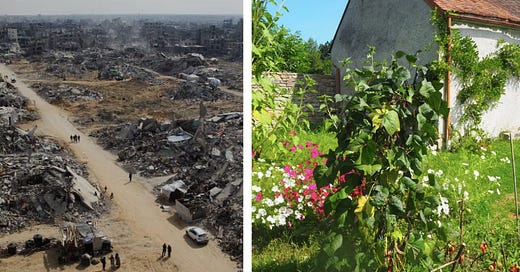In local news, the wild strawberries by our barn have doubled their numbers, the ivy we planted has taken hold, and unless we have another slug infestation we’ll have enough tomatoes, eggplant and peppers to feed the Italian army should they come north.
Our neighbor, Mrs. K., lost two chickens to a kuna (a kind of oversized weasel with a taste for, well . . . chicken), one of our plum trees keeled over in the rain, apparently from exhaustion, and our son Zack and his girlfriend adopted a puppy who’s thrown herself into her job of attacking ankles, running in circles, strangling herself on her lead, and falling into food.
In world news, our Dementor in Chief took a shot at distracting from his failed military parade by going to war with Iran, two million human beings in Gaza continued to slide toward starvation (and to be shot by the Israeli military), and four tech bros with no training were promoted to the rank of lieutenant colonel (one step below general), giving them access to the kind of information needed to control the citizenry of the world’s oldest democracy.
More than ever these days, I find myself balancing between two kinds of thing. The first is close, first-hand, and generally good; the second is distant, virtual and uniformly bad. By which I mean horrendous.
How to balance the near and the far, how to husband the first, draw from it, while at the same time keeping the higher frequencies open, is the challenge.
It’s not a new one.
A quarter-century ago, in an essay for Harper’s 150 year anniversary issue, I struggled with this same subject.
“Tragedy carries farther in the charged air of the early twenty-first century,” I wrote; “death speaks with a louder voice. In Ankara, Turkey, a father unable to get the heavy equipment to move the earthquake rubble listens to his daughter die for two days – and we listen with him. In a town near Albany a mother tortures her three-year-old to death for taking a piece of candy without asking first – and we read about it over our morning Danish. In Pereira, Colombia, a father digs his son out of an ocean of mud, then re-buries him in a common grave, and the image of his grief – the mud caked in the hair on his chest, his face broken by weeping – stabs us quickly in the heart on the 7:43 and again halfway through the morning meeting . . . . Soft-shelled and transparent in our vulnerability, we press the button, turn the page, swaddle ourselves in layers of irony. Or try.”
Well, the twenty-first century ain’t early any more, I’m twenty-five years older, and I’m still trying. And failing - as are most of us. The refresh button is not our friend.
This is a problem without an easy solution. For untold millennia, ignorance kept the circle of our concerns small. If you were tending your sheep in the African tribal kingdom of Aksum on October 24th in the year 79, you returned from the fields and enjoyed your evening meal and made love and lived out the rest of your short life without ever having to consider the agony of those who died when Vesuvius erupted. You didn’t know about Vesuvius, so as far as you were concerned, Vesuvius never happened.
This was the norm for the next 1,700 years, more or less. Until the invention of the telegraph in 1837, it could take weeks or months for international news to find you, if it ever did. Towns published newspapers once a week. Most of their news was local.
As recently as the 1940’s, tending his chickens on his farm in Maine, the novelist and essayist E.B. White, whose work I return to for sustenance and sanity, still got the bad news just once a day unless he chose to turn on the radio, which he generally did not.
Which allowed him some space, some balance. Which allowed him some time to digest what needed digesting.
Those days are gone and they aren’t coming back. Which means we have to adjust: balance isolation and engagement, self-protection and knowledge. Or try. It won’t be easy; we haven’t even begun to understand the psychological toll that the information age has exacted on the human psyche, nor grappled with the risk that coming generations may develop the psychological calluses that keep them sane at the cost of their empathy.
We need to know, and yet the burden of knowing can sometimes feel unbearable.
We want to cut the cord – “tend our own garden” in Voltaire’s memorable phrase – and yet the moral imperative of engagement won’t let us.
And so, having no answers, I’m going to continue doing both as best I can, wrestling with the wider world while nurturing the near one.
The Dementor is going to have to share the billing with slugs and weasels.
Stay tuned.





In Nov. 1978, I spent two weeks w/ a high school friend backpacking in the Grand Canyon When we came out, we went to a local convenience store near the South Rim for supplies. Out front was a newspaper box (remember those?), with an improbable headline splashed across the front— “900 dead in Jonestown.” The juxtaposition, the obscene dissonance (cognitive and otherwise, then and now) – is dizzying.
Always grateful for your humanizing gaze on our long arc of madness
Your essay has inspired me to create a new ratio rule: Seinfeld/News must be greater than or equal to four, where "Seinfeld" is the time spent watching reruns and News is the time spent with the news. Ideally, the ratio should be irrational.